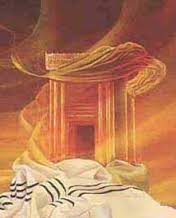Torah Portion of DEVARIM Deuteronomy 1:1–3:22
Moshe Kempinski
www.shorashimshop.com
The Torah portion of Devarim is always read before the Fast of Tisha B’Av. The portion begins with these words;
“These are the words ( Devarim) that Moses spoke to all Israel, on the other side of the Jordan, in the wilderness, in the Arabah, opposite the Sea of Reeds, between Paran and Tofel, and Laban and Hazeroth, and Di-zahab; eleven days from Horeb, by way of Mount Seir to Kodesh-Barnea.” (Deut. 1:1)
The Fast of Tish B’Av recalls the destruction of the two Jerusalem Temples. How are we to understand the eternal connection between these two events?
When reading the text of that first verse, one wonders why we need such a complicated description of the locations of the Israelites journey.
Rashi quoting the Sifri explains this is a list that enumerates all the places where the Israelites angered Hashem. Yet there is no description of the incident but merely hints at those failures.
In the words of the Sifri ; “In the desert”—the time they complained: “If only we would have died in the desert” (Exodus 17:3).
“In the Aravah (Plain)”—their worship of Baal Peor in the Plains of Moab (Numbers 25).
“Opposite Suf”—the complaints and crying out they made at the shores of Yam Suf, the Red Sea (see Exodus 14:11 )
“Paran”—the sin of the spies, who were dispatched from Paran (Numbers 13 ).
“Tofel” and “Lavan” (meaning “libel” and “white”)—their libeling the white manna (Numbers 21:5).
“Chatzerot”—where Korach’s mutiny against Moses took place.
Rashi explains Moshe reminded them of the pitfalls and failures of their long voyage through the wilderness without demoralizing them.
Yet there is a deeper level as well.
Moshe declares; “How ( Eicha ) can I bear your trouble, your burden, and your strife all by myself?( Deuteronomy 1:12)
Was Moshe actually declaring resigned disappointment with his people or was it coming from a weakening of faith. If that was true we would hear an immediate response from Hashem.
Moshe was not complaining or surrendering to his worries. He was actually declaring and asking a rhetorical question.
” How ( Eicha) can I bear all your burden by myself?” . Moshe was actually saying to them” I could not have done all that without the help of G-d”.
When reflecting on our life journeys ,we remember times of courage ,or fear ,empowerment or weakness. Yet throughout that whole journey we begin to realize that Hashem was there at every step.
Otherwise there would not have been another step.
The Hebrew word Eicha (How can I ) is critical in understanding that process.
We see the use of that same word in the book of Isaiah when the prophet discusses the results of moving away from G-d’s purpose;
“But if you refuse and rebel, you shall be devoured by the sword, for the mouth of Hashem spoke.How has ( Eicha) she become a harlot, a faithful city; full of justice, in which righteousness would lodge, but now murderers”:( Isaiah 1:20-21)
We in fact see the use of that word again to begin the lamentations that we recite on the eve of the Ninth of Av , “O how ( Eicha ) has the city that was once so populous remained lonely! “( Lamentations 1:1)
The word Eicha spelled with the Hebrew letters Aleph Yud Chaf and Heh shows up elsewhere in the Torah, but there it is pronounced differently.
After failing with the forbidden fruit in the Garden of Eden, Adam and Eve try to hide from G-d.
At that point Hashem calls out to them “And Hashem God called to man, and He said to him, “Where are you ( Ayecha) ?” (Genesis 3:9) (spelled Aleph Yud Chaf and Heh )
Hashem did not need Adam and Eve to tell Him where they were hiding. He in fact wanted them to begin to ask themselves that exact question.
“Where are we”? ”Where have we drifted off to” ? Where can we reconnect to the roots and anchor of who we are meant to be” ?
The geographical descriptions that Moshe alludes to was not a history lesson but rather a reminder to his people of information they would need before their entry into the Land of Promise. He was warning them that in the future that would be faced with similar challenges and conflicts.
Those cycles of events would continue to recur until that people as a faithful whole would do the Tikkun-Fixing that would repair the conflict. That will be the important lesson for the people of Israel to remember in their own history. It would be a lesson for all mankind.
Remembering history is all about asking those exact questions. “Where are we”? ”Where have you drifted off to” ? “Have we learnt from the Past of Pain to build a Future of Hope”?
That is the true lesson of Tish B’Av.
